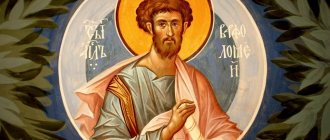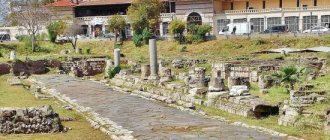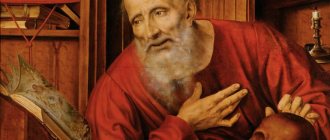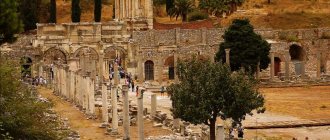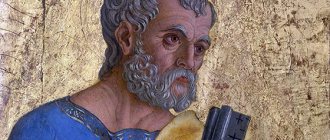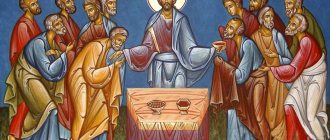What is an Apostle is a person who receives a specific message from God.
Let's see what happened. Jesus gathers the disciples together. A meeting of sorts. Next, He CHOSES from a total number of 12 people and CALLS them. This suggests that He had certain criteria or knowledge based on which He did this. And he assigns a certain title to these selected disciples. Apostle is the name of who these people henceforth became. So, who is an Apostle?
Meaning of the word
An apostle is a messenger, an ambassador. (In a broader sense) - an equipped fleet, a sea expedition.
This means that Jesus was going to send these people somewhere to carry out a specific mission. And for this purpose he equipped him with certain supernatural qualities. The word “apostle” appears 80 times in the New Testament. Let's look at some places with this expression.
What do we see? This word is also used in our translations to designate the MESSENGERS (apostles) of the churches for a specific ministry. And Jesus is called the messenger (apostle) of our confession. In other words, we must see
- those who elect
- those who are elected
- a specific purpose for which they are elected and sent.
Who elects?
God's Apostles, the apostles of Christ, were chosen by God.
Recommendations
- ^ a b c
Liddell and Scott's Greek-English Lexicon, Oxford, 1944. - Wilhelm Schneemelcher, Robert McLachlan Wilson New Testament Apocrypha: Writings Relating to the Apostles
- 2003 - 0664227228 Page 7 “Unfortunately, the adjective noun Απόστολος appears in the LXX only in one passage, and indeed as a translation of the Hebrew shaluach (passive participle shalach - 1 Kings 14: 6)". - Cassell's Latin Dictionary, revised by Marchant and Charles
- Cannistraci, David. (1998). The Apostles and the Emerging Apostolic Movement
. Royal books. ISBN 0-8307-2338-2. OCLC 180766628. - Cannistraci, David (1996). The Gift of the Apostle: A Biblical View of the Apostleship and How God Uses It to Bless His Church Today
. Royal books. pp. 194–195. ISBN 978-0830718450. - McConkie, Bruce R. (1979). Mormon Doctrine
. Book of Deseret. paragraph 46. ISBN 0-88494-062-4. - "quorum of the twelve apostles." Mormon Newsroom
. March 18, 2014 - "Quorums of seventy." ChurchofJesusChrist.org
. Retrieved September 1, 2016. - Ephesians 2:20
- Articles of Faith 1:6
- Concise Encyclopedia of Islam
, K. Glass,
Messenger - Muslims believe Ibrahim received the Scrolls of Abraham
, Musa received the Torah, David in Islam received the Psalms, Jesus the Gospel in Islam and Muhammad received the Quran - A-Z of Prophets in Islam and Judaism
, B. Wheeler,
Apostle - Koran 37:139
- Koran 37:123
- Koran 19:54
- Koran 7:85
- Koran 10:47
Ministry of the Apostle
The ministry of an apostle is integral to all five ministries in the Church.
For creation
Today many “apostles” have appeared who do not serve to create, but to destroy the Body. That is, it is easy to identify an Apostle by his goals. I want to emphasize that this is not about those who speak the gospel so that people will receive salvation. This is creation. I'm talking about those who come to you in this rank and behave differently.
Unity of faith and knowledge of the Son
Unity of faith can only be achieved if the source and goal of faith is Christ. Knowing the Son of God is the main goal of Christ's servants.
Perfect husband
Please note - not in “husbands and wives” perfect, but in the HUSBAND. That is, perfection is achieved in the Body, and not separately.
Full age of Christ
We talk about this in great detail here.
Teaching-hesitant babies
This is the category of people who constantly jump around churches and doctrines. One teaching is “the same, the same,” and after a while another. When a person is instructed in the truth, no one can shake him. A very clear goal of ministers, which, unfortunately, today is being replaced by complete submission to the teachings professed by the main person in the church.
Bonding Ties
Ministers must promote bonds that bind, and bonds of Christ.
LiveInternetLiveInternet
Apostles (from the Greek άπόστολος - messenger, messenger) are the closest disciples of the Lord Jesus Christ, chosen by Him and sent to preach the gospel of the Kingdom of God and the establishment of the Church.
The names of the nearest twelve apostles are as follows:
- Andrew (Greek andreas, “courageous”, “strong man”), brother of Simon Peter, nicknamed in legend the First Called, because, being a disciple of John the Baptist, he was called by the Lord earlier than his brother on the Jordan.
- Simon (Hebrew shimon - “Heard” in prayer), son of Jonah, called Peter (Acts 10:5,18). Greek the word petros corresponds to the Aramaic kipha, rendered by the Russian word “stone”. Jesus confirmed this name for Simon after His confession as the Son of God in Caesarea Philippi (Matthew 16:18).
- Simon the Canaanite or Zealot (from Aram. Kanai, Greek zelotos, which means “Zealot”), a native of the Galilean city of Cana, according to legend, was the groom at whose marriage Jesus Christ and His Mother were, where Christ turned water into wine (John 2:1-11).
- Jacob (from the Hebrew verb akav - “to conquer”) Zebedee, son of Zebedee and Salome, brother of the Evangelist John. The first martyr among the apostles, put to death by Herod (42 - 44 AD) through the beheading (Acts 12:2). To distinguish him from James the Younger, he is usually called James the Elder.
- James the Younger , son of Alpheus. He was called by the Lord Himself to be one of the 12 apostles. After the descent of the Holy Spirit, he preached first in Judea, then accompanied St. to Apostle Andrew the First-Called in Edessa. He spread the gospel gospel in Gaza, Eleutheropolis and neighboring places, and from there he went to Egypt. Here, in the city of Ostratsina (a seaside town on the border with Palestine), he was crucified on the cross. (Many sources associate James Alpheus with James, the brother of the Lord, commemorated by the Church at the Council of the 70 Apostles. Probably, the confusion occurred due to the fact that both apostles were called James the Younger).
- John (Greek form Ioannes from the Hebrew name Jochanan, “The Lord is merciful”) Zebedee, son of Zebedee and Salome, brother of James the Elder. The Apostle John was nicknamed the Evangelist as the writer of the fourth Gospel and the Theologian for his deep disclosure of Christian teaching, the author of the Apocalypse.
- Philip (Greek “horse lover”), a native of Bethsaida, according to the Evangelist John, “the same city with Andrew and Peter” (John 1:44). Philip brought Nathanael (Bartholomew) to Jesus.
- Bartholomew (from Aram. son of Talmai) Nathanael (Heb. Netanel, “Gift of God”), a native of Cana of Galilee, about whom Jesus Christ said that this is a true Israelite, in whom there is no guile (John 1:47).
- Thomas (Aram. Thoma, in the Greek translation Didymus, which means “twin”), famous for the fact that the Lord Himself allowed him to put his hand into His side and touch His wounds in order to eliminate his doubts about His resurrection.
- Matthew (Greek form of the Hebrew name Mattathias (Mattathia) - “gift of the Lord”) is also mentioned under his Hebrew name Levi. Author of the Gospel.
- Judah (Heb. Yehuda, “praise of the Lord”) Thaddeus (Heb. praise), brother of the Apostle James the Younger.
- And Judas Iscariot (nicknamed after his place of birth in the city of Kariot), in whose place after the ascension of Christ, Matthias (one of the forms of the ancient Hebrew name Mattathias (Mattathia) - “gift of the Lord”) ( Acts 1:21-26). Matthias followed Jesus from His baptism and witnessed His resurrection.
Among the closest apostles is the Apostle Paul, a native of the city of Tarsus in Cilicia, miraculously called by the Lord himself (Acts 9:1-20). Paul's original name was Saul (Saul, Hebrew Shaul, “asked (from God)” or “borrowed (to serve God)”). The name Paul (Latin Paulus, “lesser”) is the second Roman name adopted by the apostle after his conversion for the convenience of preaching in the Roman Empire.
In addition to the 12 apostles and Paul, 70 more chosen disciples of the Lord are called apostles (Luke 10:1), who were not constant eyewitnesses and witnesses to the works and life of Jesus Christ. Tradition refers to the 70 apostles as Mark (Latin for “hammer”, the second name of John from Jerusalem) and Luke (short form of the Latin name Lucius or Lucian, which means “luminous”, “bright”).
The apostles who wrote the Gospel - Matthew, Mark, Luke and John - are called Evangelists. The apostles Peter and Paul were the supreme apostles, that is, the first of the supreme ones.
Saints who preached Christian teaching among the pagans are sometimes equated with the apostles, for example, Equal-to-the-Apostles Emperor Constantine the Great and his mother Queen Helena, Prince Vladimir of Kiev.
Celebrating the memory of each of the 12 apostles of Christ separately, the Orthodox Church from ancient times also established the celebration of the Council of the Glorious and All-Praised 12 Apostles on July 13 (new style) (see CALENDAR). Also, on the previous day (July 12), the celebration of the Glorious and All-praised Supreme Apostles Peter and Paul takes place.
Apostles of Christ: The Twelve Who are they? You and I, dear ones, are starting to get acquainted with an extremely interesting and useful topic. We will talk about the Apostles of Christ. Who are these people? The people who made up the group to whom Christ entrusted a sacred mission: to bring the Gospel to the whole world? We will talk about each Apostle personally. Today is an introductory topic to our story, and then we will get acquainted with the Apostles of Christ by name. Do not just discover for yourself through these essays the personality of each Apostle, but mentally turn to him with prayer, make yourself a friend in Heaven. Feel in your heart the closeness to us of these people, whom we often undeservedly forget (maybe we still remember about Apostles Peter and Paul, and others...), but who, nevertheless, were the closest people to Christ (after the Mother). Who are the Apostles? "Apostle" (Greek apostolos ) means "messenger". This famous Greek word denotes people called by Jesus Christ, who became His Disciples and sent by Him to preach the Gospel and to build the Church. Why Twelve? There is no doubt that Christ wanted to create a New people, which He called the Church. So, the foundation of this People was laid by the creation of the community of the Twelve. "Twelve" was their name and essence. They are the representatives and harbingers of the New Israel, messengers to Israel today and its judges at the end of time. This explains the special nature of their calling, namely, to be a very specific circle that cannot be expanded at will. The importance of maintaining this number in its integrity while they carry out their mission is evidenced by at least the desire of the Apostles to restore the number after the betrayal of Judas (See: Acts 1, 15-26). Matthew is chosen to replace the fallen Judas. The number 12 was not chosen by chance. The number 12 as the number of the tribes of Israel (according to the number of the sons of Jacob, from whom all the people of God descended) was a sacred number, denoting the “number of perfection.” It was this number that in the minds of the Jews began to denote the completeness of the people of God. By the time of Christ’s preaching, only two and a half clans remained out of the twelve clans of Israel: Judah, Benjamin and half of Levi. The remaining nine and a half clans were considered extinct since the conquest of the Northern Kingdom (722 BC). Only at the advent of eschatological times, as the Jews believed, would God bring these disappeared, dissolved among others, assimilated peoples to their homeland and thus restore the people of God, consisting of twelve generations. Christ’s election of the Twelve clearly indicates that this long-awaited time is coming, the eschatological era is coming. However, instead of gathering these disappeared twelve generations somewhere, that is, instead of restoring the former, Old Israel, Christ creates a New Israel: the Church. For this, Christ chooses 12 ancestors of the New People of God - the Apostles - and sends them into the world. The twelve form forever the foundation of the Church: “The wall of the city has twelve foundations, and on them are the names of the twelve apostles of the Lamb” (Rev. 21:14). Pre-Christian parallels with the New Testament Apostles Since ancient times, attempts have been made to identify the Apostles of Christ with some institution that existed in pre-Christian times. Thus, it is known that the Jews sent authorized representatives to carry out certain tasks. They were called shaliakh. At a time close to the ministry of Christ, such envoys, authorized by the Sanhedrin, carried out communication between Jews scattered around the world and carried out other assignments. The Jews even had an important formula that helped to understand the place and meaning of shaliach: “The messenger of man, like the one who sent” (Berachot V. 5). This formula showed that the messenger has the same legal rights as the one who sent him, that is, he speaks and acts as the sender himself would speak and act. If we remember Christ’s statement on this topic, we will see that the Savior treats the mission of his messengers in the same way: “A servant is not greater than his Master, and a messenger is not greater than him who sent him” (John 13:16). They are His successors, the Apostles bring the Message of Christ as authorized representatives of Christ to the whole world. However, while bringing the ministry of the Apostles closer to the institutions that existed in Judaism, they cannot be considered identical. The apostles received not legal rights, but grace; they were sent not for administrative purposes, but for charismatic ones. Their task: to be witnesses of Jesus Christ and continuers of His work. All the most important things (the Salvation of the world, the reconciliation of the world and man with God, the sending of the Holy Spirit, etc.) were accomplished by Christ, but the task of the Apostles is much more modest: - to inform the world about what has happened; – and thus allow every person to accept Salvation and grace. Tasks of the Apostles The Apostles ignite the souls of people with the Gospel, found Christian communities, and pray for the descent of the Holy Spirit on people. The ministry of the Apostles is dynamic; it consists in spreading the Christian Gospel to the ends of the earth. “It is not good for us to leave the word of God and worry about the tables” (Acts 6:2), say the Apostles, emphasizing that they cannot even afford to take care of the needs of the Christian community in view of another, priority service for them - the ministry of the word. We read about the same thing in Ap. Paul, called by Christ Himself and received from Him the Apostolic appointment: “If I preach the gospel, then I have nothing to boast about, because this is my necessary duty, and woe to me if I do not preach the gospel!” (1 Cor. 9:16) If we remember this task of the unique Apostolic ministry, we will understand the categorical words of the ancient Christian document “Didache” (early 2nd century): “Concerning the apostles and prophets, according to the commandment of the Gospel, do this. Let every Apostle who comes to you be accepted as the Lord. But he should not stay more than one day, and if there is a need, then another, but if he stays three days, then he is a false prophet. When leaving, let the Apostle accept nothing except bread (as much as is needed) to his place of lodging for the night, but if he demands silver, he is a false prophet.” We see that the Apostle is a person who should not know any life and any ministry other than the Gospel. His task is to found a community and bring people to Christ. The further care of the community lies with other people (bishops, priests), but the Apostle must hurry further, to where they still do not know about Christ. The Orthodox Church believes that the ministry of the Apostles in our world can still take place today. A whole number of people who went to new lands, preached in territories that did not know about Christ, sometimes with a threat to their lives, were called Equal-to-the-Apostles in the Church. These are: Mary Magdalene (preaching in Gaul - present-day France); Nina (Georgia); Emperor Constantine and his mother Queen Helena (Italy and other lands); Prince Vladimir and Princess Olga (Rus); Bishop Nikolai (Kasatkin) (Japan), etc. Why were these particular people called? At all times, people have tried to understand: why did Christ call these particular people and not others to be His disciples? We can give any arguments for or against this or that idea, but it must be said that we do not know for sure why these and not others were called upon. “Then He went up the mountain and called to Him whom He Himself wanted; and came to Him. And he appointed twelve of them, that they might be with Him” (Mark 3:13-14). Whom He Himself wanted is a key phrase for understanding why these, perhaps imperfect, or even downright unworthy ones, like Judas, were called, and not others. This calling did not happen suddenly, not spontaneously. When Christ began His ministry, many people came to Him. Many considered themselves, to one degree or another, His disciples. Someone came, someone left... The creation of the community of the Twelve most likely occurred in the second year of Christ’s ministry. “In those days He went up the mountain to pray and spent the whole night in prayer to God. When the day came, he called his disciples and chose twelve of them, whom he named apostles” (Luke 6:12-13). From these words of Ap. Luke we see that the creation of this community was preceded by a conversation between Jesus and the Heavenly Father. The Gospels recorded a touching moment of Christ’s explanation with the Apostles about the many confusing words and actions of Jesus: “From that time on, many of His disciples departed from Him and no longer walked with Him. Then Jesus said to the Twelve, “Will you also go away?” Simon Peter answered Him: Lord! who should we go to? You have the words of eternal life” (John 6:66-68). The Apostles are endowed with special grace-filled gifts “Then He ascended the mountain and called to Him whom He Himself wanted; and came to Him. And he appointed twelve of them to be with Him and to send them to preach, and so that they would have the power to heal diseases and cast out demons” (Mark 3:13-15). We have already spoken about the fact that Christ called whom He Himself wanted. Now let's turn our attention to the second part of the above fragment. Christ creates a group of disciples so that they go to preach, and in order for their mission to be successful, so that people believe them, Christ gives the Apostles grace-filled opportunities. The ability to work miracles, which the Apostles had in early Christian times, seems doubtful to many today, because today we do not observe such abilities. But this is not surprising. This is explained by the fact that the Apostles received special gifts of grace from Christ: “As you go, preach that the Kingdom of Heaven is at hand; Heal the sick, cleanse the lepers, raise the dead, cast out demons; Freely you have received, freely give” (Matthew 10:7-8). These gifts contributed to the fact that the world believed in Christ and was inspired by the Gospel. The Apostles were faced with an incredibly difficult task: to move the rusty wheel of human History... The attitude of the world to the Apostolic preaching The Savior warned the disciples: “Behold, I send you out like sheep among wolves” (Matthew 10:16). These words may seem unusual if we remember what was said to the Apostles who were going to preach in Galilee. This period of preaching was serene. The apostles were received in homes, listened to, and were shown respect... However, these words began to be perceived completely differently by the disciples when Christ was crucified and His name began to be blasphemed by the Jewish elders and spiritual leaders. In Israel itself, the Apostles began to be persecuted; their mission was even more terrible outside Israel, in pagan lands. The Apostle Paul writes about his ministry: “I... was in labor... in wounds... in prison and many times at the point of death. Five times the Jews gave me forty stripes minus one; three times I was beaten with sticks, once I was stoned, three times I was shipwrecked, I spent a night and a day in the depths of the sea; I have been on travels many times, in dangers on rivers, in dangers from robbers, in dangers from fellow tribesmen, in dangers from pagans, in dangers in the city, in dangers in the desert, in dangers at sea, in dangers between false brothers, in labor and in exhaustion, often in watching, in hunger and thirst, often in fasting, in cold and nakedness” (2 Cor. 11: 23-27). Apostleship is a ministry that takes place in all times of the Church. Neither the absence of holy orders nor female gender is an obstacle to the exercise of this ministry (we have already said that those who have worked in the field of apostolic ministry and succeeded are called equal to the apostles). However, every Christian who wishes to strive in the apostolate must remember that this service requires complete dedication and is fraught with difficulties and trials. We can talk for a long time about the different facets of the Apostolic ministry, however, having opened the Gospel, let us get to know the Twelve Pillars of our Faith more closely.
Series of messages “Apostles”:
Part 1 - Apostles of Christ: Peter Part 2 - Apostles of Christ: Simon the Canaanite ... Part 12 - Apostles of Christ: Thaddeus, aka Judas Jacob or Levway Part 13 - Apostles of Christ: Matthias the Publican Part 14 - Apostles of Christ: Twelve. What are they?
Test of the Apostles
So, we have figured out the meaning of the word “apostle”. But our goal is to also deal with those who are not the Apostles (messengers) of Jesus Christ. This was very important in the Ephesian church, where people came who CALLED THEMSELVES apostles (messengers) of Jesus Christ. The Lord Himself praises this church because they TESTED these people and found them to be liars.
Above we wrote a little about how to recognize a true servant, and on this page we study in more detail the issue of testing the Apostles.
Let me once again emphasize the importance of the ministry of the Apostles. They lay the foundation on which others will build. And they have supreme power in the Church. And we, having recognized someone as an Apostle, will be obliged to obey him.
Power of the Apostles
These places do not testify to the “cinema power” that people are accustomed to from films about “saviors”. Power is given for creation. And God watches over this power, just as He watched over the power of Moses. Paul is confident that he has authority from God. And therefore he could order, he could apply severity. As we have already said, creation, construction, is the essence of the five-fold ministry. And God gave power to the servants to create. Therefore, building churches and serving in congregations looked supernatural.



